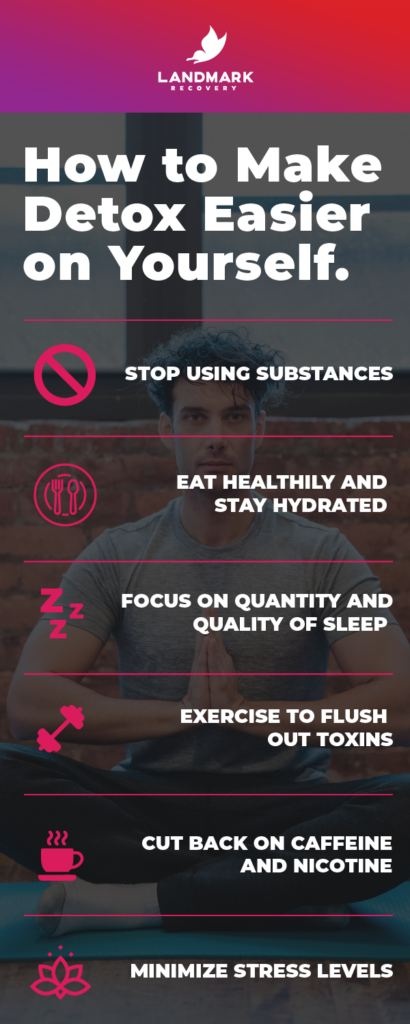Updated: June 9, 2023, at 4:06 p.m.
Facing drug or alcohol detox is a big step, whether you’re doing it at home or in a rehab center. This process is different for everyone, but there are ways to make it easier. It might be tempting to detox at home for milder addictions, but for more severe cases, medically supervised detox at a treatment center is the safest option.
We’re here to help guide you through this challenging time, offering practical advice to make detox more manageable.
6 Ways to Make Detox Easier on Yourself
The goal of detoxification is simple: you want to purge your body of the toxins accumulated through the sustained abuse of alcohol or drugs. Luckily, there are many ways to expedite this process and strengthen your chances of smoothly transitioning into the next phase of recovery (hopefully residential treatment).

- Stop using substances
- Eat healthily and stay hydrated
- Focus on quality and quantity of sleep
- Exercise to flush out toxins
- Cut back on caffeine and nicotine
- Minimize stress levels
Stop using substances
This may seem like a statement of the obvious, but detox won’t begin until you discontinue the use of the substance in question. On one hand, the quicker you stop using alcohol or drugs, the quicker you can start shedding toxins. On the other hand, if you are using opioids, opiates, benzodiazepines, or alcohol, it can be dangerous and possibly fatal to abruptly quit “cold turkey.”
Formulate the most effective strategy to stop using substances promptly but safely.
Eat healthily and stay hydrated
Anyone undergoing medical detox can expect nutritious foods to be provided as standard. If you’re detoxing at home, minimize your intake of processed foods, sugars, and bad fats. Instead, eat plenty of whole foods, fruits, and veggies. If substance use has affected your appetite, juicing is a great way to get more nutrients onboard.
Alongside a healthy diet, drink 2 liters of water each day to keep yourself hydrated. Alcohol dehydrates the body, so undo the damage inflicted during your drinking days.
Water is also a powerful natural detox agent. The more water you drink, the more powerful the flushing effect and the quicker your body will be toxin-free.
Focus on quality and quantity of sleep
Most people abusing drink or drugs find their sleep patterns are disrupted.
Everyone needs differing amounts of sleep, but 7 to 8 hours each night is generally considered optimum.
When detoxing in a treatment center, medication can be administered short-term to help you normalize your sleeping routine.
Exercise to flush out toxins
Exercise has proven benefits when used as part of addiction treatment programming.
As well as strengthening your body and improving your mood, exercising can also speed up the process of detoxification. As you boost your heart rate and start perspiring, you can accelerate the departure of those unwelcome toxins.
For anyone currently incapable of meaningful exercise, a sauna can deliver proxy benefits as you sweat and flush toxins from your system.
Cut back on caffeine and nicotine
Coffee and cigarettes not only contain harmful toxins, but these substances also interfere with sleeping patterns.
Beyond this, nicotine and caffeine can act as triggers and increase your chances of relapse before your recovery has gained traction.
Minimize stress levels
Anyone ready to quit drinking alcohol or drugs likely has a life that’s chaotic and full of stressors. You should do everything you can to minimize stress as you commit to detox and recovery. Cortisol is a hormone that’s produced in response to stress. This is harmful to your health and detrimental to your recovery, so stay calm.
Consider yoga, meditation, or other recovery tools if you’re finding it hard to destress.
Medical Detox: The Safest, Most Effective Strategy
Medical detox helps you to eliminate all toxins from your system over five to ten days. According to SAMHSA, the average duration of detox is less than eight days.
Expect close medical monitoring as you undergo the acute withdrawal phase. You will have access to prescription medications if appropriate, including:
- Acamprosate: to treat alcohol withdrawal
- Ambien: to help with sleep issues
- Clonidine: to help regulate blood pressure
- Diazepam: to prevent seizures
- Lorazepam: to treat anxiety symptoms
- Suboxone or methadone: to treat opioid withdrawal
- Vivitrol: to mitigate cravings for alcohol or drugs
What to Expect from Alcohol Detox
The acute withdrawal symptoms from alcohol abuse seldom last more than a week.
Here’s what to expect in terms of symptoms and potentially helpful medications for alcohol detox.
Alcohol Withdrawal Symptoms
- Accelerated heartbeat
- Anxiety
- Deep fatigue
- Depression
- Headaches
- Impaired focus
- Memory problems
- Nausea
- Shaking
- Sweating
- Tremors
- Vomiting
FDA-Approved Medications
- Acamprosate: to lessen the intensity of withdrawal symptoms
- Disulfiram: to interfere with the way alcohol is metabolized
- Naltrexone: to block opioid receptors in your brain
What to Expect from Opioid or Opiate Detox
Detoxing from opioid painkillers or heroin is often most comfortable in a residential treatment center.
You can expect to experience similar withdrawal symptoms to alcohol detox, and you can also benefit from medication-assisted detox with opioids or opiates.
Opioid and Opiate Withdrawal Symptoms
- Accelerated heartbeat
- Anger
- Anhedonia (inability to feel pleasure)
- Bad dreams and nightmares
- Anxiety
- Depression
- Exhaustion
- Extreme agitation
- Headaches
- Impaired focus
- Irritability
- Memory problems
- Nausea
- Shaking
- Sweating
- Tremors
- Vomiting
FDA-Approved Medications
- Buprenorphine: to lessen withdrawal symptoms without inducing euphoria
- Methadone: to reduce cravings and prevent relapse
- Naltrexone: to block opioid receptors in your brain
What Comes Next?
Detox is a physical process, but sustained sobriety requires mental strength, too. By detoxing in the right way, you’ll build the strongest foundation for recovery.
Maybe you’ve already detoxed from alcohol or drugs, and you’re ready to commit to treatment. Perhaps you’re still drinking or using drugs and need assistance to detox in a controlled setting. Either way, if you’re ready to take action, then call the friendly Landmark Recovery admissions team at 888-448-0302.

Choose Recovery Over Addiction
We're here 24/7 to help you get the care you need to live life on your terms, without drugs or alcohol. Talk to our recovery specialists today and learn about our integrated treatment programs.




